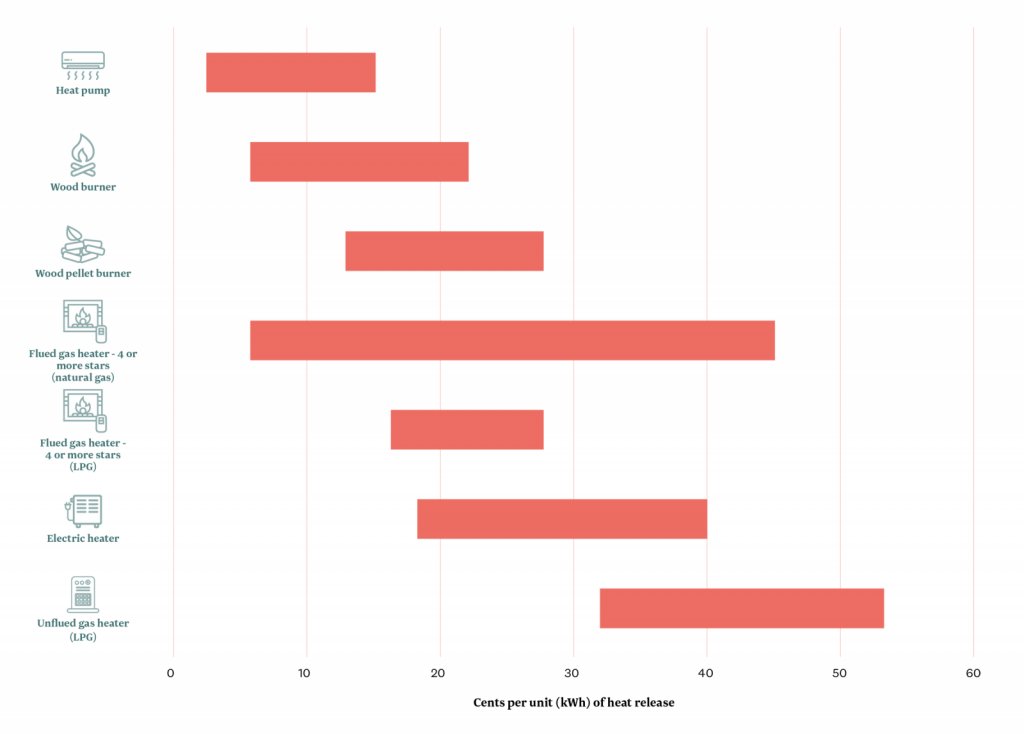Energy Efficiency
Heat pumps offer the best energy efficiency of any heating method. This is because a heat pump doesn’t create heat. It simply transfers heat from one place to another.
Even when it’s cold outside, there is warmth present in the atmosphere. Using the same compressor technology as a fridge or freezer, a heat pump collects heat from the outside air and transfers the heat to inside the home.
The process is incredibly energy efficient. This is clear from the coefficient of performance (COP) of a heat pump, which measures how much heat you get per kW of energy consumed.
While a regular electric heater has a COP of 1 (1kW of energy produces 1kW of heat), a heat pump typically has a COP of 2-5 (1kW of energy produces 2-5kW of heat).
Compare electricity providers with Canstar Blue
Canstar Blue rates NZ power companies for customer satisfaction and value for money, see the table below for some of the results, or you can click on the buttons below for the full results of our survey, and to compare bundled utility providers.
^ By clicking on a brand or 'details' button, you will leave Canstar Blue and be taken to either a product provider website or a Canstar Blue NZ brand page. You agree that Canstar Blue NZ’s terms and conditions apply (without limitation) to your use of this service,to any referral to a product provider from our website, and any transaction that follows. Canstar Blue may earn a fee for referrals from its website tables, and from sponsorship (advertising) of certain products. Payment of sponsorship fees does not influence the star rating that Canstar Blue awards to a sponsored product. Fees payable by product providers for referrals and sponsorship may vary between providers, website position, and revenue model. Sponsorship fees may be higher than referral fees. Sponsored products are clearly disclosed as such on website pages. They may appear in a number of areas of the website such as in comparison tables, on hub pages and in articles. Sponsored products may be displayed in a fixed position in a table, regardless of the product’s rating, price or other attributes. The table position of a sponsored product does not indicate any ranking, rating or endorsement by Canstar Blue. See How we are funded for further details.
Canstar Blue NZ Research finalised in April 2023, published in June 2023.
Canstar Blue’s latest review of NZ power companies compares them on customer satisfaction. The table above is an abridged version of our full results, available here.
See Our Ratings Methodology
Cost
If you’re comparing an electric heater from Kmart, and a heat pump, then there’s no real comparison. A heat pump will undoubtedly cost you more to buy and install.
→Related article: Best Kmart Heaters For Winter
But in the long term, heat pumps provide real savings. Acording to the Energy Efficiency and Conservation Authority (EECA), a heat pump has some of the lowest operating costs available.

Sustainability
Everyone loves the romance a fireplace provides. But less romantic is the harmful CO² it releases. Heat pumps don’t emit any harmful particles; they don’t burn environmentally harmful gas, like flued and unflued gas heaters; and their long lifespans avoid the waste associated with cheap electric heaters that don’t even last the winter.
And they’re incredibly energy efficient. This lowers demand on our national electricity grid during peak winter months, when fossil fuel electricity generation is often used to top up supplies of sustainably generated power.
Multiple uses and functions
Heat pumps are great for keeping you warm in winter, but they’re also useful and incredibly cheap to run for cooling in summer.
Aside from functioning as an air conditioner, many heat pumps have modes for drying laundry hung indoors, as well as air purification and even deodorisation.
The airflow provided also helps prevent moisture build-up and unhealthy humidity. This compares very favourably to unflued gas heaters, which actually add humidity into your home.
Precise control, comfort and convenience
A heat pump lets you take precise control of a room’s temperature, for ultimate comfort. With other forms of heating, sitting in front of or near the appliance can result in too much direct heat, while being far from the appliance can leave you feeling no warmth at all.
And a heat pump can be set to turn off and on when required. Plus maintenance requirements are relatively low. Depending on how frequently it’s used, a quick clean of the filters every few months is all that’s needed.
→Related article: How to Clean Heat Pump Filters
Heat pump: the best way to heat a Kiwi home
If you can manage the upfront purchase and installation costs, a heat pump is undoubtedly an excellent option for the home. It provides unrivalled comfort at the lowest operating cost and has multiple benefits that can be enjoyed all year round.
If you are looking at installing a heat pump, there are a few options that can help you manage the costs. You can talk to your mortgage provider about a low-interest (or no-interest) home loan top-up, such as those on offer from ANZ and Westpac.
There are also grants that can help with insulation and heating costs.

About the author of this page
This report was written by Canstar Content Producer, Andrew Broadley. Andrew is an experienced writer with a wide range of industry experience. Starting out, he cut his teeth working as a writer for print and online magazines, and he has worked in both journalism and editorial roles. His content has covered lifestyle and culture, marketing and, more recently, finance for Canstar.
Enjoy reading this article?
You can like us on Facebook and get social, or sign up to receive more news like this straight to your inbox.
By subscribing you agree to the Canstar Privacy Policy



Share this article